Kaltxì nìmun, ma eylan,
Tse, EuroAvatar 2013 is well behind us. And what a great meet-up it was! John and I were so happy to be able to get to know and spend time with members of the European Avatar community and lì’fyaolo’. The language classes, the radio play, the singing, the food, the wonderful birthday party for John, the great organization (irayo nìtxan, ma Passi!)—everything was fantastic.
And as icing on the cake, the Berlin meet-up was followed just over a week later by an unexpected but delightful mini-meet-up with French fans in Paris!
I’ve posted some pictures below, but first, here are a few vocabulary items plus a point of grammatical clarification that were prompted by the Berlin meet-up:
okup (n., O.kup) ‘milk’
Sa’nok prrnenur yomtìng fa okup sneyä.Tìng mikyun
‘A mother feeds an infant with her milk.’
loi (n., LO.i) ‘egg’
Rolun ayoel tsrulmì hì’ia pxeloit ateyr.Tìng mikyun
‘We found three little white eggs in the nest.’
tsyeym (n.) ‘treasure; something rare and of great value’
Käteng oe hu eylan Perlinmì a mrrtrr lu tsyeym a ke tsun tswiva’ kawkrr.Tìng mikyun
‘The (5-day) week I spent with my friends in Berlin is a treasure that I’ll never forget.’
The “double-dative” construction
As you know, to say ‘I sent my brother a message,’ you put the direct object of ‘send,’ i.e. the thing you sent (in this case, a message) in the objective or accusative case (the “t-case”), and the indirect object, i.e. the person to whom the message was sent, in the dative case (the “ru-case”). And of course you use the agentive case for ‘I’:
Oel ’upxaret tsmukanur oeyä fpole’.Tìng mikyun
‘I sent my brother a message.’
But what if it’s ‘I wrote my brother a message’?
‘Write,’ as you know, is a si-construction, which has a different syntax: ‘I’ is in the subjective case, which is used with intransitive subjects, and the direct object in English becomes a dative in Na’vi. (I like to think of it as: ‘I do writing to a message.’ That’s terrible English but good Na’vi.) But what about ‘my brother’? Is that in the dative case too? Yes, it is:
Oe ’upxareru tsmukanur oeyä pamrel soli.Tìng mikyun
‘I wrote my brother a message.’
We call this a “double-dative” construction for the obvious reason.
The question that immediately comes up is this: given the two datives, one representing the direct object of ‘write’ and one the indirect object, will there ever be confusion as to which is which? Fortunately, this doesn’t happen. One of the datives is in the class of things that can be written (messages, notes, blog posts, books, etc.) and the other in the class of things that can be written to—basically, people. The two classes don’t overlap, so there’s no ambiguity.
Of course, writing was only introduced on Pandora with the advent of the Sawtute, so you might think that this construction was introduced at that time as well. But in fact it was already in place in the language. Consider law si, for example, which means ‘to make clear’:
Ralur law soli fo oeru.Tìng mikyun
‘They made the meaning clear to me.’
As with pamrel si, there’s no danger of ambiguity here. The other possible interpretation, ‘They made me clear to the meaning,’ makes no sense.
You may also recall Jake’s line from Avatar, which also has two datives:
Ma Eytukan, lu oeru aylì’u frapor.Tìng mikyun
‘Eytukan, I have something to say (to everyone).’
In this case, the word order allows you to interpret the sentence correctly. (‘Everyone has something to say to me’ would be Lu frapor aylì’u oeru.)
And now for the promised pictures.
Berlin welcoming committee at the train station:
At camp, we were welcomed by a genuine brass band!
The birthday boy at his party:
What a beautiful cake!
We had some wonderful singers and musicians in our group:
Formal group portrait:
The Paris contingent!
Looking ahead:
Excitement is building for the U.S. Avatar Meet-up in the Washington, DC area (more precisely, at Shenandoah National Park in Virginia).
I’ll be teaching a Na’vi 102 class and an informal 101 refresher as well. John will be there too. We’re really looking forward to reconnecting with old friends and meeting new ones. Txo tsivun, rutxe ziva’u!
By the way, as I’m putting together the 102 class, if you have any ideas about content—anything in particular you’d like to hear about or practice that would suitable for a 102-level class, please let me know, either here or privately.
Vospìayvay, ma smuk.


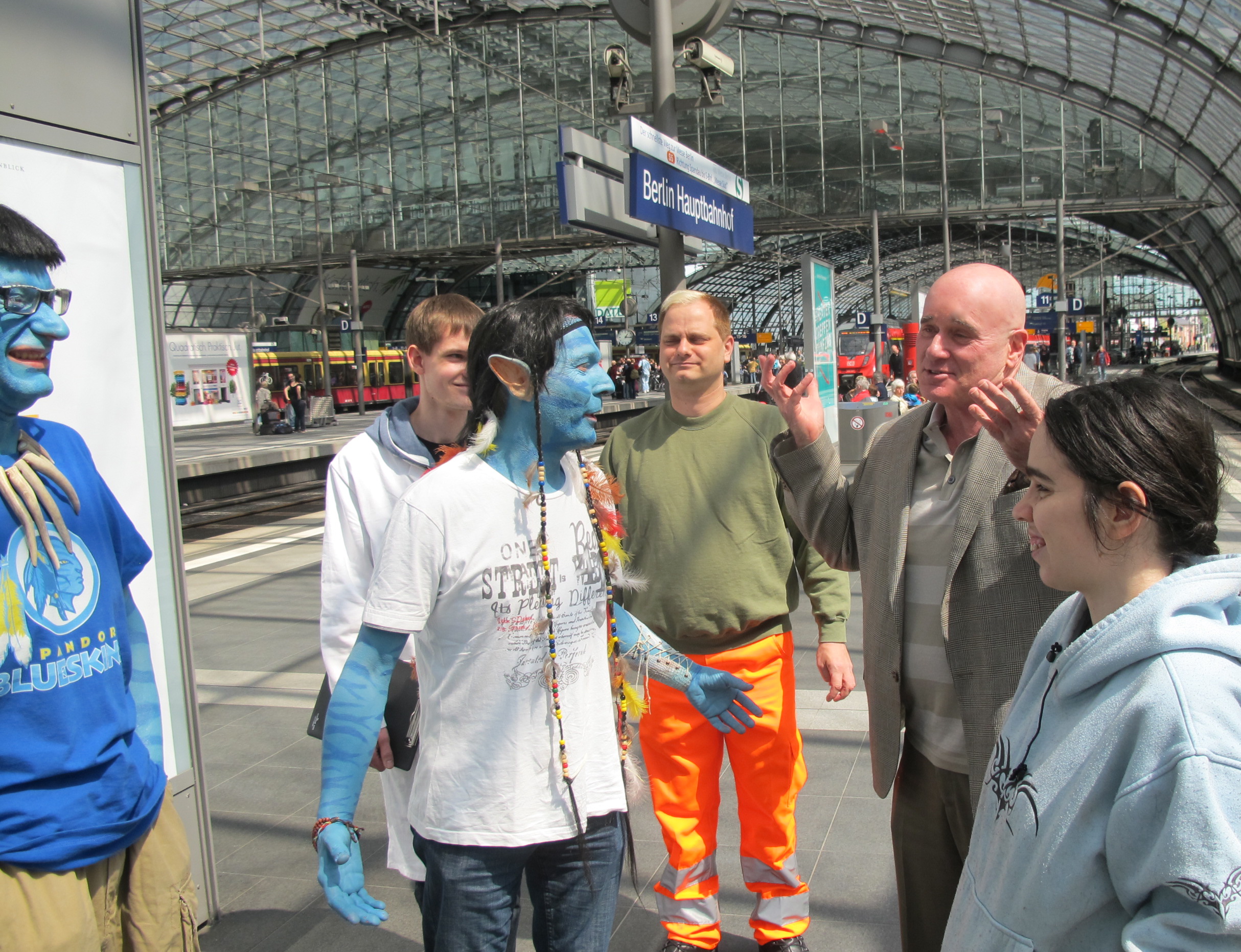
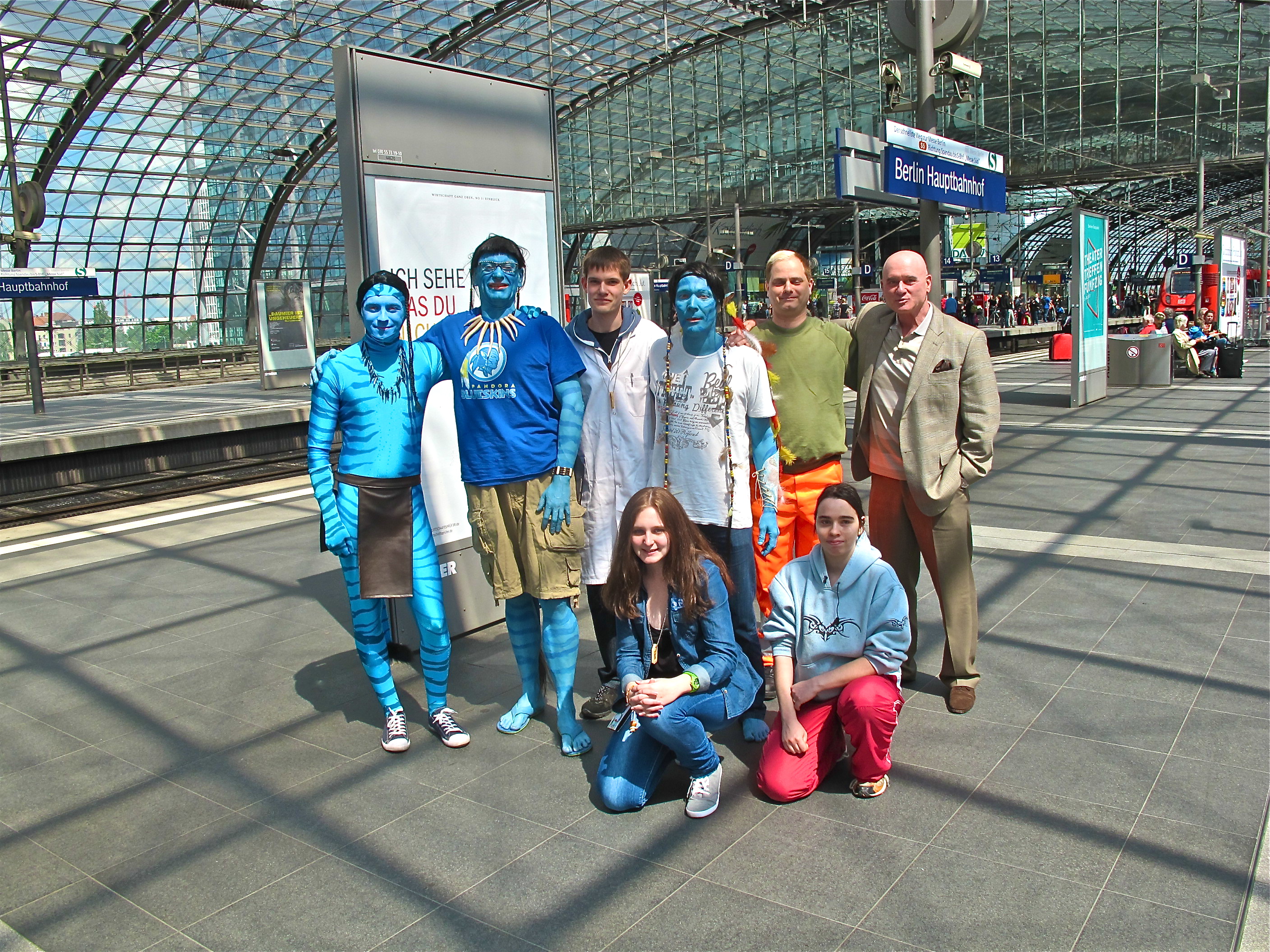
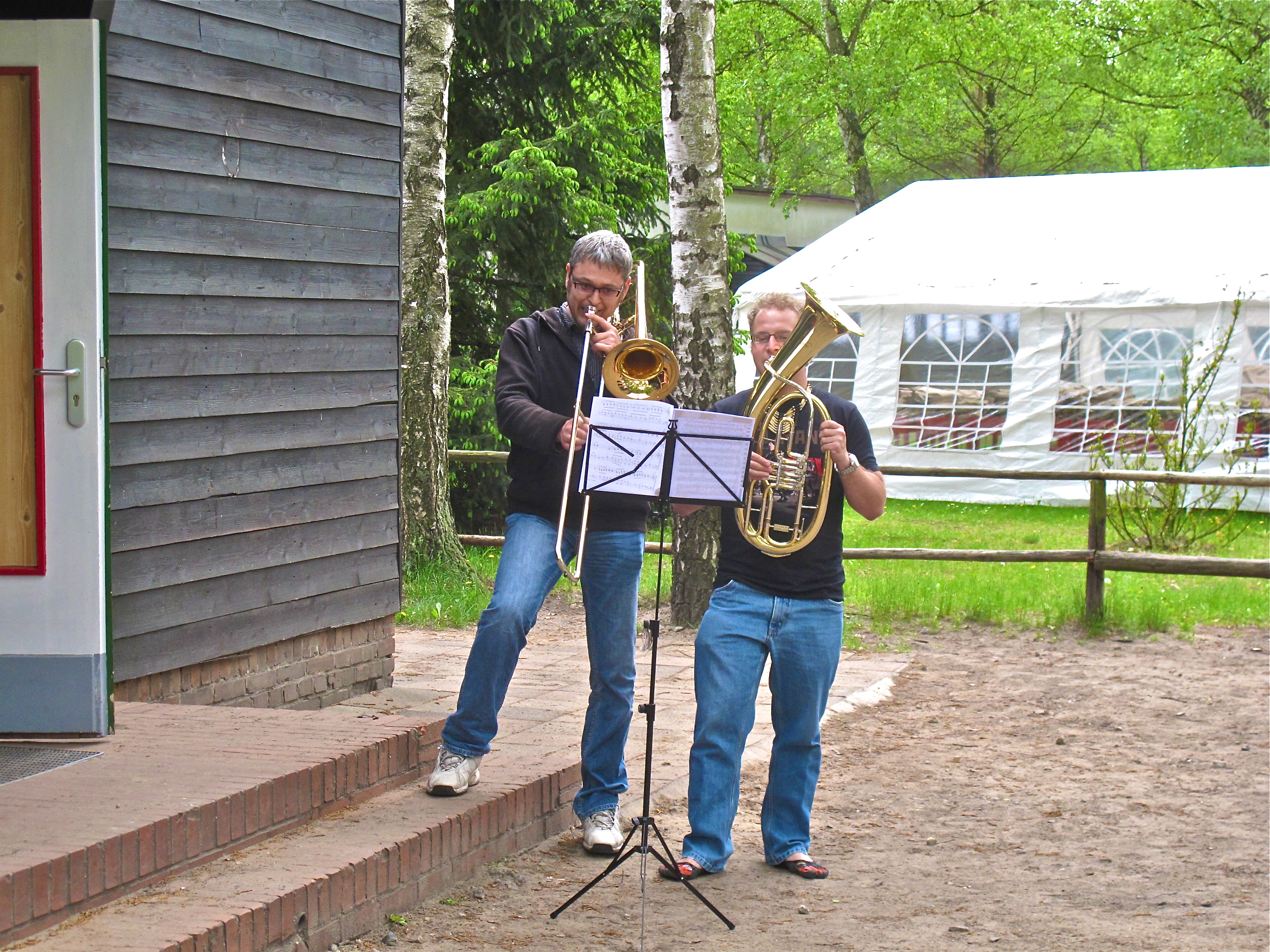
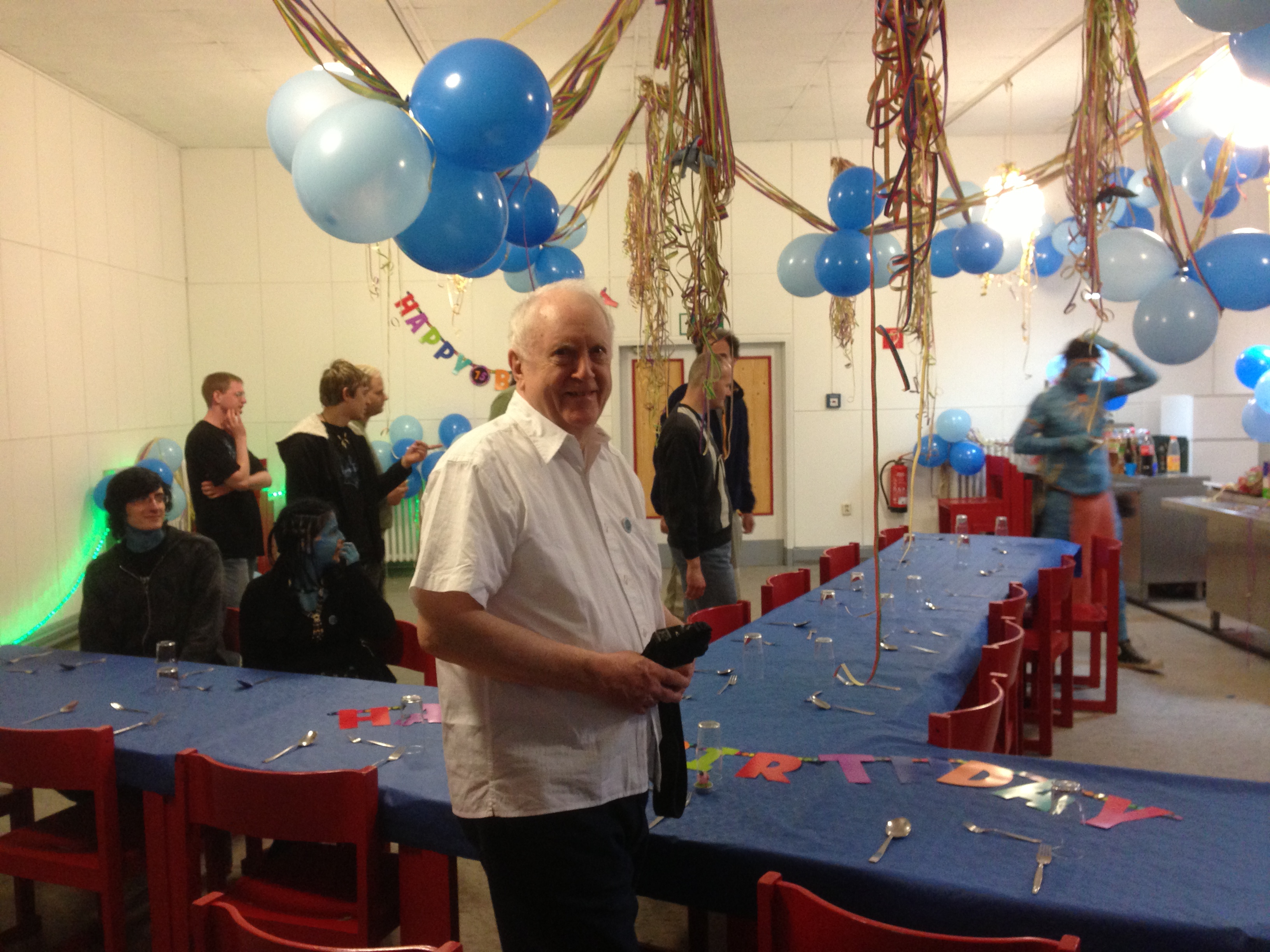

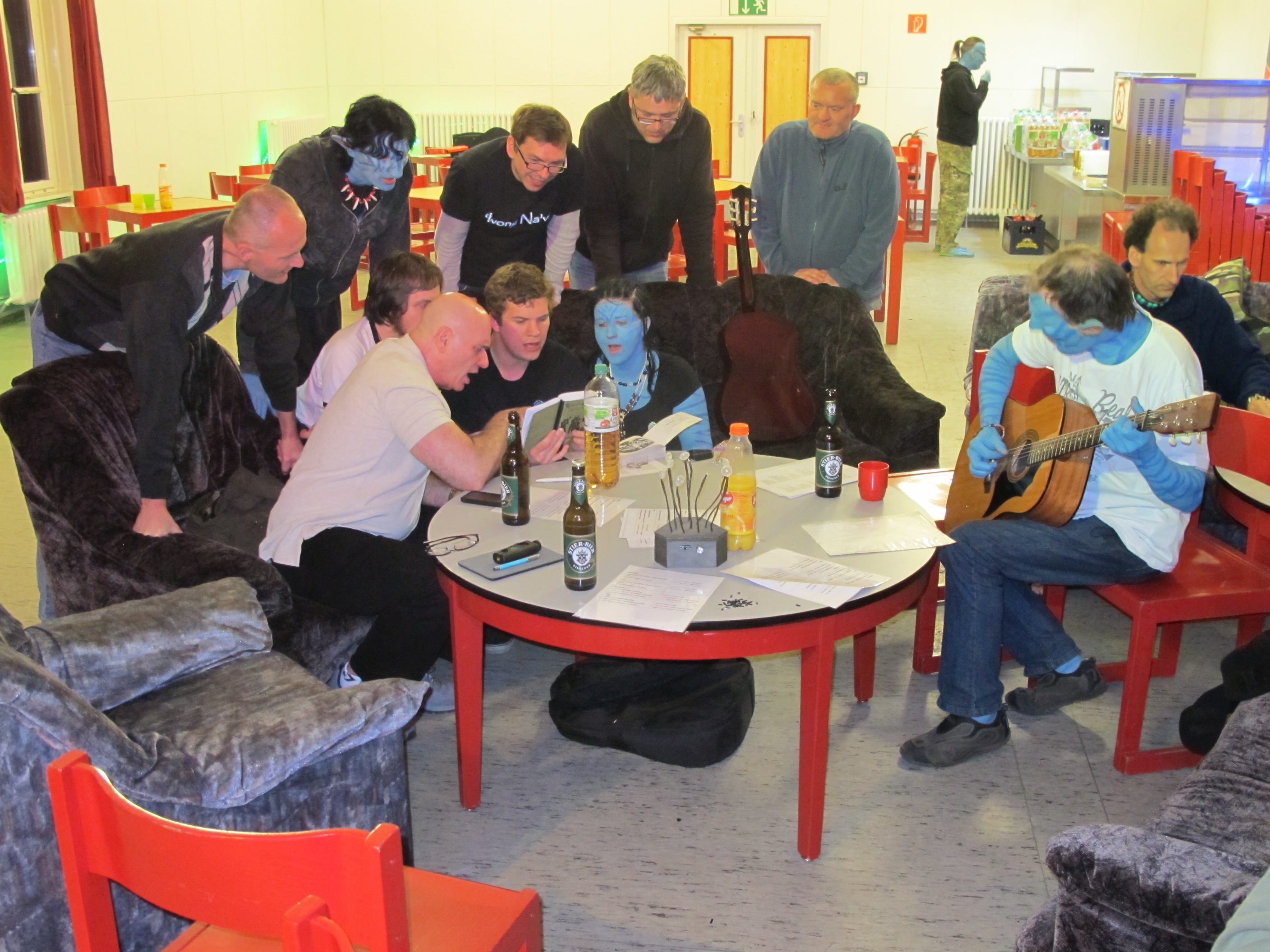
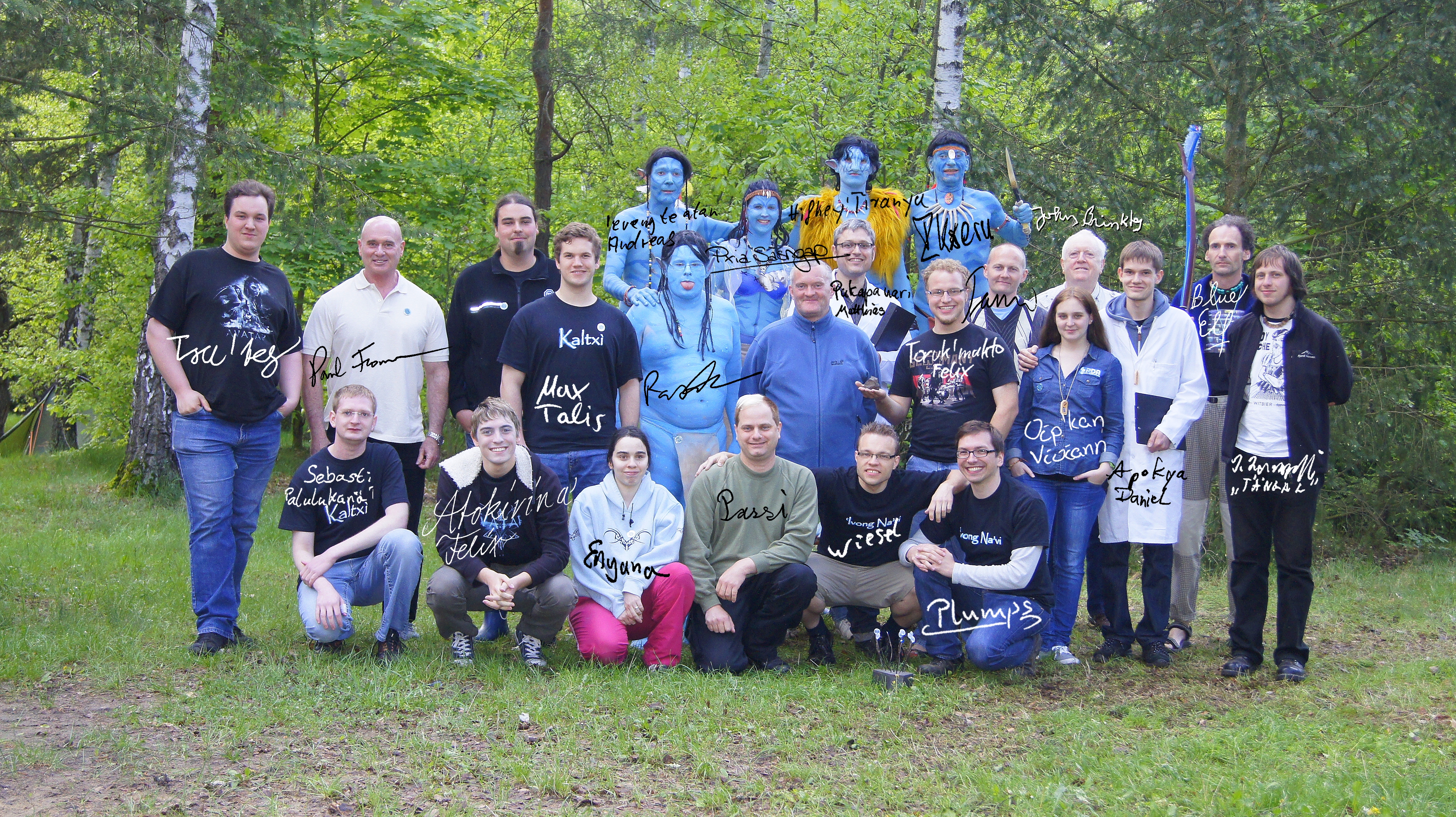


Aylì’uri amip irayo ma ayultxatu sì nawma Karyu Pawl!
(Tse, oel näk okupit.)
*pxelì’uri
Ma Karyu!
Tìsopìri atxantsan seykxel sì nìtram! )))
Ulte pxelì’uri sì horenìri amip irayo seiyi.
Tsantxan nìtxan!
It’s too bad that I could’n be with you there in Berlin. *sad*
I hope it will be repeated in the future. A reload!
However, the important point is, you had a lots of fun there! =)
– ngeyä Tìtstewan
TXANTSAN!
So’ha! Pxelì’u amip! 🙂
I hope the U.S. meet-up goes just as well as the Berlin one did. It looks like you had a lot of fun – and that cake is kosman!
Ayrelìri oeru sunu nìtxan! Tsun ayoel aypankakit* ‘ivem set. 🙂 Mipa aylì’u lu sìltsan frakrr.
*pancakes
For the Na’vi 102 lesson. I would humbly suggest sentences with uncommon construction and lots and lots of practice lessons. I would assume most people interested in the Na’vi 102 class either have an understanding of the basics (the 101 class) and are looking for more advanced topics or are long time speakers (such as myself) who are severely out of practice and could use plenty of refresher material.
I suspect this would also be useful for many beginner speakers as well. In this way they could be introduced to some more advanced topics but also get plenty of speaking and listening practice as well. Speaking and listening practice would definitely be useful for all I’m sure.
Aside from that, it would be interesting to have people pair up and speak a sentence in Na’vi (to the best of their ability) and then give the intended translation to it in English. The other person could then respond in Na’vi (again, as best they can) and then give the English translation. In this way people could practice all the parts of speaking a new language.
Finally, when I was learning Na’vi I found that one of the best learning tools was translating bits of Na’vi from the film. Back in the day, before we had such a wealth of knowledge, information was very scarce. I remember me and about 10+ people staying up into the early morning hours trying to figure out what exactly Neytiri was saying during her first meeting with Jake. Ahhh, what fun. We all learned a lot for those sessions. Anyway, it may be interesting to extend that to a learning environment as well. Perhaps create one or two really tough sentences for the entire group (or smaller groups) to attempt to translate.
Just some ideas.
Wow very nice story and pictures ! Our signatures in the group picture, this is soo awesome ! TXANTSAN!
Pxelì’uri amip seiyi irayo atxan, ma Paul!
Tsyeym answers one of my questions/requests I’ve sent you after meeting in Berlin (for which I still didn’t get answer, nìkeftxo :()
Also thank you for official note about double dative, I brought it into forum already, but it is good to have note here on blog. I had small problem to understand this sample sentence: Ralur law soli fo oeru, but finally it made me to laugh. I was thinking – where is “meaning” hidden, when that sentence speaks about Ralu? After short moment I discovered it 🙂 Languages can be even funny to use. How nice “word play”.
For the July meetup, we will have a group of mainly ‘102 level’ speakers, with a few beginners and a few advanced speakers/writers. Since Na’vi is supposed to be a spoken language, I think there is a golden opportunity here to get people to converse with each other in Na’vi, even if it is fairly rudimentary conversation. I think the skillset that you teach in your 102 class should encourage people in attendance to use the language as much as is practical. Although I don’t think we will be able to get to the point of a NìNa’vi Nì’aw trr, there is a lot of opportunities with this group to have fun with Na’vi! (These new words (along with pankak 😉 ) help, as we can describe much of breakfast now!)
Kaltxì ma smuktu leNa’vi !
Fèiultxa lameiu txantsan nìtxan nìtxan nang, oe peng !
Aynga tsun tsive’a ayrelti alahe fìtseng (http://forum.learnnavi.org/euroavatar/euro-avatar-paris-edition-ultra-short-meeting-with-pawl-john-_/) ^_^
Irayo nìtxan ma mesmukan ultxafpi 😉